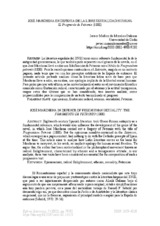José marchena en defensa de la libre sexualidad humana : el Fragmento de Petronio (1800)
José marchena in defence of free human sexuality: the fragmento de petronio (1800)
Autor
Muñoz de Morales Galiana, Javier
Editor
UCOPressFecha
2022Materia
EpicureísmoIlustración radical
Ateísmo
Sexualidad
Petronio
Epicureanism
Radical Enlightenment
Atheism
Sexuality
Petronius
METS:
Mostrar el registro METSPREMIS:
Mostrar el registro PREMISMetadatos
Mostrar el registro completo del ítemResumen
La literatura española del XVIII tomó como referente fundamental la de la antigüedad grecorromana, lo que también pudo repercutir en el género de la novela, en el que José Marchena llevó a cabo una falsificación de Petronio con el título de Fragmentum petronii (1800). Pero la moral epicúrea contenida en el Satiricón, surgida en un contexto pagano, nada tenía que ver con los preceptos católicos de la España de entonces. El presente artículo pretende analizar cómo la literatura latina sirve de base para que Marchena lleve a cabo, en su obra, una apología implícita de la libertad sexual humana. Para poder precisar esto último, se ha contextualizado al autor en el movimiento filosófico conocido como Ilustración radical, caracterizado por el ateísmo y la actitud transgresora, rasgos estos dos últimos que se han considerado, tras nuestro análisis, como imprescindibles para la composición de un texto tan inclinado al progreso. Eighteenth-century Spanish literature took Greco-Roman antiquity as a fundamental reference, which would also influence the development of the genre of the novel, in which José Marchena carried out a forgery of Petronio with the title of Fragmentum Petronii (1800). But the epicurean morality contained in the Satyricon, which emerged in a pagan context, had nothing to do with the Catholic precepts of Spain at the time. This article aims to analyse how Latin literature serves as the basis for Marchena to carry out, in his work, an implicit apology for human sexual freedom. To argue this, the author has been contextualized in the philosophical movement known as radical Enlightenment, characterized by atheism and a transgressive attitude; in our analysis, these two traits have been considered as essential for the composition of such a progressive text.

